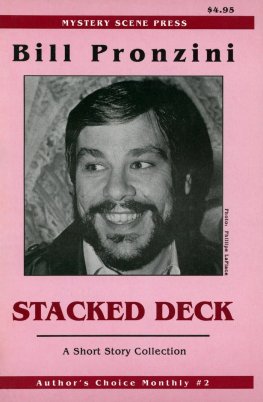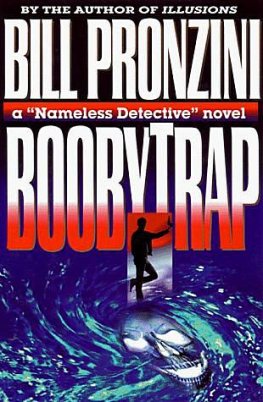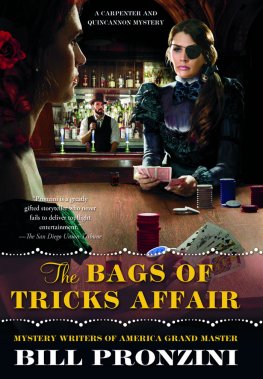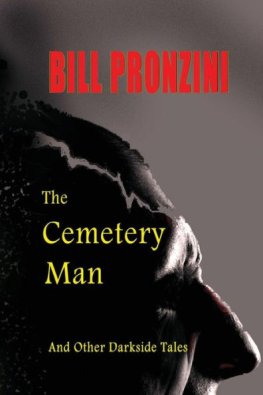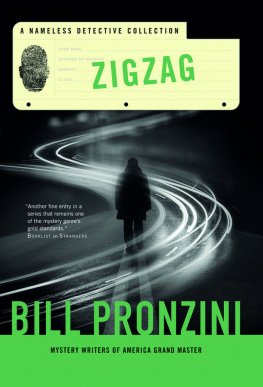Bill Pronzini
More Oddments
On a balmy March afternoon in the third full year of the War Between the States, while that conflict continued to rage bloodily some two thousand miles distant, Fergus and Hattie OHara jostled their way along San Franciscos Embarcadero toward Long Wharf and the riverboat Delta Star. The half-plank, half-dirt roads and plank walks were choked with horses, mules, cargo-laden wagons and with all manner of humanity: bearded miners and burly roustabouts and sun-darkened farmers; rope-muscled Kanakas and Filipino laborers and coolie-hatted Chinese; shrewd-eyed merchants and ruffle-shirted gamblers and bonneted ladies who might have been the wives of prominent citizens or trollops on their way to the gold fields of the Mother Lode. Both the pace and the din were furious. At exactly four P.M. some twenty steamers would leave the waterfront, bound upriver for Sacramento and Stockton and points in between.
OHara clung to their carpetbags and Hattie clung to OHara as they pushed through the throng. They could see the Delta Star the moment they reached Long Wharf. She was an impressive side-wheeler, one of the floating palaces that had adorned the Sacramento and San Joaquin rivers for more than ten years. Powered by a single-cylinder, vertical-beam engine, she was 245 feet long and had slim, graceful lines. The long rows of windows running full length both starboard and larboard along her deckhouse, where the Gentlemens and Dining Saloons and most of the staterooms were located, refracted jewel-like the rays of the afternoon sun. Above, to the stern, was the weather deck, on which stretched the texas; this housed luxury staterooms and cabins for the packets officers. Some distance forward of the texas was the oblong glassed-in structure of the pilothouse.
Smiling as they approached, OHara said, Now aint she a fine lady? He spoke with a careless brogue, the result of a strict ethnic upbringing in the Irish Channel section of New Orleans. At times this caused certain individuals to underestimate his capabilities and intelligence, which in his profession was a major asset.
She is fine, Fergus, Hattie agreed. As fine as any on the Mississippi before the war. How far did you say it was to Stockton?
OHara laughed. A hundred twenty-seven miles. One night in the lap of luxury is all well be having this trip, me lady.
Pity, Hattie said. She was in her late twenties, five years younger than her husband; dark-complected, buxom. Thick black hair, worn in ringlets, was covered by a lace-decorated bonnet. She wore a gray serge traveling dress, the hem of which was now coated with dust.
OHara was tall and plump, and sported a luxuriant red beard of which he was inordinately proud and on which he doted every morning with scissors and comb. Like Hattie, he had mild blue eyes; unlike Hattie, and as a result of a fondness for spirits, he possessed a nose that approximated the color of his beard. He was dressed in a black frock coat, striped trousers, and a flowered vest. He carried no visible weapons, but in a holster inside his coat was a double-action revolver.
The Delta Stars stageplank, set aft to the main deck, was jammed with passengers and wagons; it was not twenty till four. A large group of nankeen-dressed men were congregated near the foot of the plank. All of them wore green felt shamrocks pinned to the lapels of their coats, and several were smoking thin, long-nine seegars. Fluttering above them on a pole held by one was a green banner with the words Mulrooney Guards, San Francisco Company A crudely printed on it in white.
Four of the group were struggling to lift a massive wooden crate that appeared to be quite heavy. They managed to get it aloft, grunting, and began to stagger with it to the plank. As they started up, two members of the Delta Stars deck crew came down and blocked their way. One of them said, Before you go any farther, gents, show us your manifest on that box.
One of the other Mulrooneys stepped up the plank. What manifest? he demanded. This aint cargo, its personal belongings.
Anything heavy as that pays cargo, the deckhand said. Rules is rules and they apply to Bluebellies same as to better folks.
Bluebellies, is it? Ye damned Copperhead, Ill pound ye up into horsemeat! And the Mulrooney hit the deckhand on the side of the head and knocked him down.
The second crew member stepped forward and hit the Mulrooney on the side of the head and knocked him down.
Another of the Guards jumped in and hit the second crewman on the side of the head and knocked him down.
The first deckhand got up and the first Mulrooney got up, minus his hat, and began swinging at each other. The second crewman got up and began swinging at the second Mulrooney. The other members of the Guards, shouting encouragement, formed a tight circle around the fighting men all except for the four carrying the heavy wooden crate. Those Mulrooneys struggled up the stageplank with their burden and disappeared among the confusion on the main deck.
The fight did not last long. Several roustabouts and one of the steamers mates hurried onto the landing and broke it up. No one seemed to have been injured, save for the two deckhands who were both unconscious. The mate seemed undecided as to what to do, finally concluded that to do nothing at all was the best recourse; he turned up the plank again. Four roustabouts carried the limp crewmen up after him, followed by the Guards who were all now loudly singing John Browns Body.
Hattie asked OHara, Now what was that all about?
War business, he told her solemnly. Californias a long way from the battlefields, but feelings and loyalties are as strong here as in the East.
But who are the Mulrooney Guards?
Before OHara could answer, a tall man wearing a Prince Albert, who was standing next to Hattie, swung toward them and smiled and said, I couldnt help overhearing the ladys question. If youll pardon the intrusion, I can supply an answer.
OHara looked the tall man over and decided he was a gambler. He had no particular liking for gamblers, but for the most part he was tolerant of them. He said the intrusion was pardoned, introduced himself and Hattie, and learned that the tall man was John A. Colfax, of San Francisco.
Colfax had gray eyes that were both congenial and cunning. In his left hand he continually shuffled half a dozen small bronze war-issue cents coinage that was not often seen in the West. He said, The Mulrooney Guards is a more or less official militia company, one of several supporting the Union cause. They have two companies, one in San Francisco and one in Stockton. I imagine this one is joining the other for some sort of celebration.
Tomorrow is St. Patricks Day, OHara told him.
Ah, yes, of course.
Ye seem to know quite a bit about these lads, Mr. Colfax.
I am a regular passenger on the Delta Star, Colfax said. On the Sacramento packets as well. A traveling man picks up a good deal of information.
OHara said blandly, Aye, that he does.
Hattie said, I wonder what the Mulrooneys have in that crate?
Colfax allowed as how he had no idea. He seemed about to say something further, but the appearance of three closely grouped men, hurrying through the crowd toward the stageplank, claimed his attention. The one in the middle, OHara saw, wore a broadcloth suit and a nervous, harried expression; cradled in both hands against his body was a large and apparently heavy valise. The two men on either side were more roughly dressed, had revolvers holstered at their hips. Their expressions were dispassionate, their eyes watchful.
OHara frowned and glanced at Colfax. The gambler watched the trio climb the plank and hurry up the aft stairway; then he said quietly, as if to himself, It appears well be carrying more than passengers and cargo this trip. He regarded the OHaras again, touched his hat, said it had been a pleasure talking to them, and moved away to board the riverboat.

![Bill Pronzini More Oddments [Collection of stories]](/uploads/posts/book/921351/thumbs/bill-pronzini-more-oddments-collection-of.jpg)
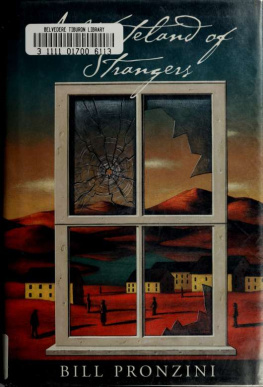
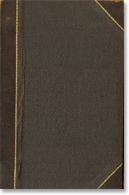
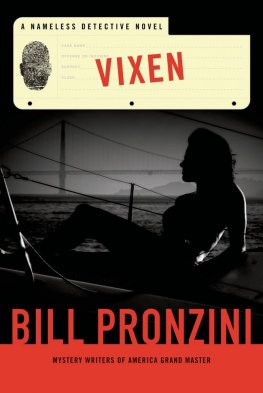

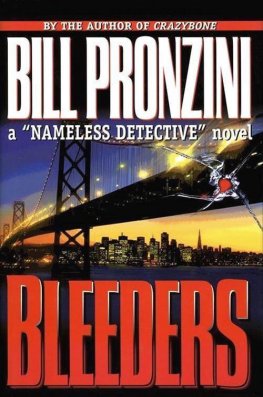
![Bill Pronzini - Sleuths [short story collection]](/uploads/posts/book/922610/thumbs/bill-pronzini-sleuths-short-story-collection.jpg)
![Bill Pronzini - Oddments [short story collection]](/uploads/posts/book/921630/thumbs/bill-pronzini-oddments-short-story-collection.jpg)
